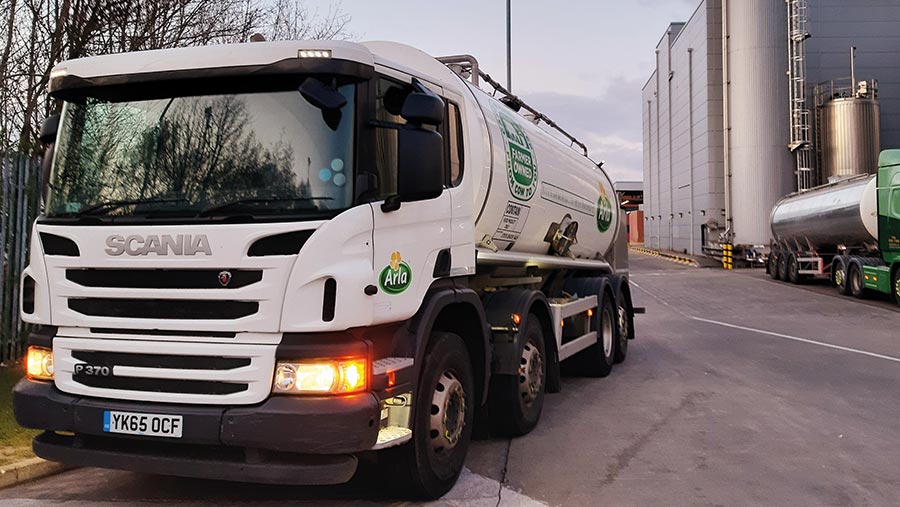Arla promises ‘ruthless focus’ to create most value for milk
 © Arla
© Arla Liquid milk exports and a significant number of new members alongside more direct suppliers form part of Arla’s five-year UK growth strategy.
In a move that could see supply to UK retailers fall, the co-op is piloting liquid milk exports to plants in Denmark and Germany, and these are working very well, according to managing director Ash Amirahmadi.
With dairy commodity markets on a high, putting this milk into products such as skimmed milk powder, butter and cheese can deliver 15-20% higher returns for farmers, Mr Amirahmadi told Farmers Weekly.
“We are calling time on cheap milk. There are huge opportunities in both exports and the UK market,” he said.
See also: Milk price differentials highlight liquid market issues
“On-farm costs are absolutely exploding, we noticed a significant increase from last summer. The Arla price has gone up 30% and is still not enough to cover the increased cost.” More is needed for farms to cover costs and invest in sustainable systems to meet the climate challenge, he said.
Sustainability credentials
An important element in realising higher prices from customers will come from the sustainability credentials of Arla farmers, with data on this having been collected since April 2020.
Farmers need to be paid at a level where they can be confident to invest in their businesses, said Mr Amirahmadi. “It’s important for a farmer-owned business such as Arla to be on the front foot here.”
With limited supply and rising demand, both local and global, difficult decisions would have to be made, he said, highlighting that the lack of profit in the own-label liquid milk market was unsustainable. “The liquid market needs to hold its own. Going into contract negotiations, what’s different this time is that there are some credible alternatives,” he said.
Longer term, the strategy aims to put some of Arla’s UK brands on global markets. “These [destinations] are not agreed yet, but I suspect Asia and some of the countries where the government is doing trade deals,” he said.
Consumers have rediscovered their love of dairy during the Covid-19 pandemic, and there is sustainable long-term growth in demand for dairy of about 3%. “Milk sales are up 6% compared with pre-Covid levels, butter is up 14% and cheese 6%. We should take heart from that,” said Mr Amirahmadi.
However, the consumer price of milk has fallen in the past 10 years from an average of 81p/litre to 75p/litre, while the consumer price index has risen 26% over the same timescale. Had milk prices kept up with inflation, the average consumer price in 2021 would have been £1.20p/litre.
Five-year investment plan
The co-op will invest £3.4bn in the next five years, with a significant proportion of this in the UK. It will be focused on efficient and sustainable production and in categories and channels such as added-value milks, food service and e-commerce. The organic and food-service sectors have a target of more than 50% growth, while Arla will also experiment with direct sales to consumers.
Mr Amirahmadi highlighted strong growth in sales of the co-op’s Starbucks products, saying that out-of-home consumption was going to be huge for Arla and would merit a fair chunk of the investment.
Arla also plans to expand its UK business through branded and added-value private-label innovation in categories such as liquid milk, yogurt, butter and spreads, milk-based beverages and cheese, aiming to grow the branded share of its revenue from 38% to 45%.
New members
The co-op has 2,100 owners or full members in Great Britain, approaching 25% of milk producers, and expects to recruit its first tranche of new suppliers in late spring this year, for 2023 production. These would be full members and new direct suppliers.
“We believe in different types of production – it’s more about the management system on the farm and the attitude to sustainability,” said Mr Amirahmadi.
